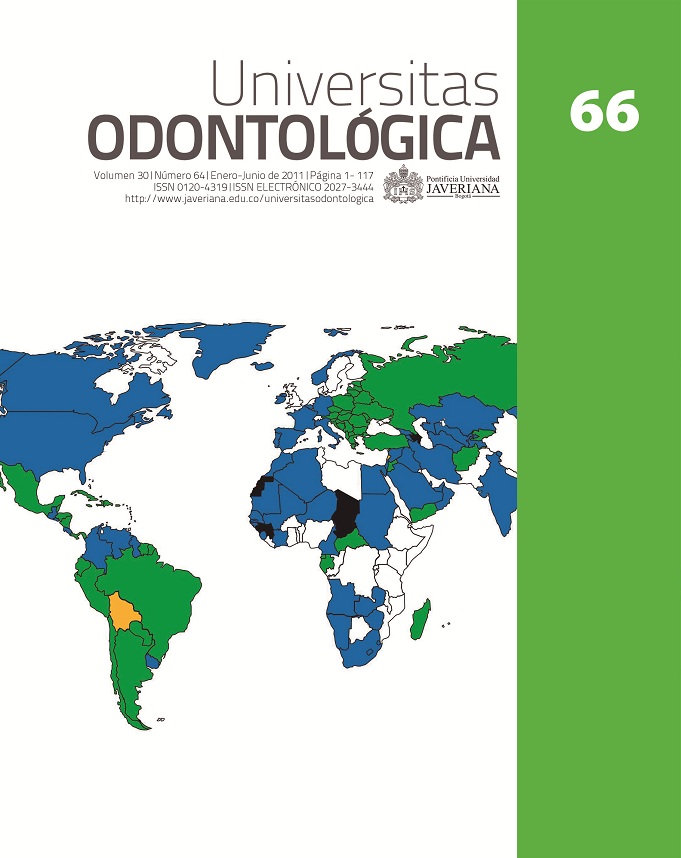Abstract
Objetivo: en este artículo se presentan los resultados de la evaluación diagnóstica del clima organizacional de la Facultad de Odontología de la Pontificia Universidad Javeriana de Bogotá, Colombia. Métodos: la evaluación se realizó mediante un cuestionario que constaba de 67 ítems para medir percepciones y que fue respondido por 1093 miembros de dicha facultad (estudiantes, profesores y personal administrativo). Las dimensiones del clima organizacional que se incluyeron en el estudio fueron colaboración, compromiso, pertenencia, respeto, imagen, coherencia, claridad organizacional, disponibilidad de recursos, tipo de autoridad, reconocimiento, trabajo en equipo, estabilidad y medio universitario. Resultados: el análisis descriptivo muestra que las dimensiones pertenencia, imagen, compromiso y trabajo en equipo son dimensiones percibidas favorablemente en la facultad. El análisis por medio de regresión múltiple estándar evidenció una correlación estadísticamente significativa y confiable al 95 % entre la percepción de coherencia, tipo de autoridad y claridad organizacional y que explican el 48,5 % del bajo nivel de respeto percibido. Conclusiones: este estudio diagnóstico permitió identificar la pertinencia de un plan de mejoramiento de la calidad del clima organizacional que incluya a los tres grupos de participantes encuestados. Se estimó que es conveniente incluir a los pacientes en posteriores mediciones.
Objective: This article presents the results of an evaluation of the organizational climate at the Pontificia Universidad Javeriana School of Dentistry in Bogota, Colombia. Methods: A 67-item survey designed to measure perceptions was answered by 1093 members of the school community (students, professors, and staff). Results: The dimensions of organizational climate included in the study were collaboration, commitment, ownership, respect, image, consistency, organizational plainness, resource availability, type of authority, recognition, teamwork, stability, and academic environment. Results: The descriptive analysis showed that the dimensions, sense of belonging, image, commitment and teamwork were favorably perceived within the school. The standard multiple regression analysis showed a significant correlation with 95 % of confidence regarding the perception of coherence, type of authority, and organizational transparency. These dimensions explain 48.5 % of perceived lower respect. Conclusions: This diagnostic evaluation showed the importance of developing a plan for improving the organizational climate including the three groups of participants surveyed. Another very important actor for the school climate is the patient. Therefore, it was planned to apply a survey to patients attending the school’s clinical facilities.
This journal is registered under a Creative Commons Attribution 4.0 International Public License. Thus, this work may be reproduced, distributed, and publicly shared in digital format, as long as the names of the authors and Pontificia Universidad Javeriana are acknowledged. Others are allowed to quote, adapt, transform, auto-archive, republish, and create based on this material, for any purpose (even commercial ones), provided the authorship is duly acknowledged, a link to the original work is provided, and it is specified if changes have been made. Pontificia Universidad Javeriana does not hold the rights of published works and the authors are solely responsible for the contents of their works; they keep the moral, intellectual, privacy, and publicity rights.
Approving the intervention of the work (review, copy-editing, translation, layout) and the following outreach, are granted through an use license and not through an assignment of rights. This means the journal and Pontificia Universidad Javeriana cannot be held responsible for any ethical malpractice by the authors. As a consequence of the protection granted by the use license, the journal is not required to publish recantations or modify information already published, unless the errata stems from the editorial management process. Publishing contents in this journal does not generate royalties for contributors.


